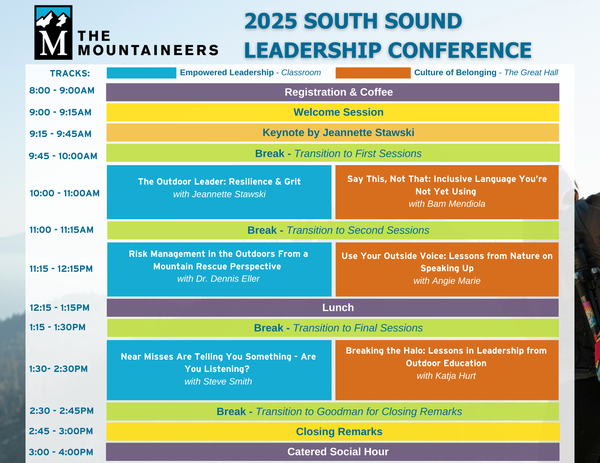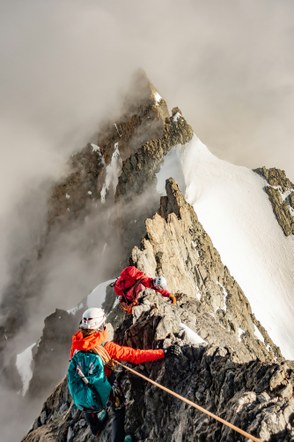South Sound Leadership Conference Breakout Sessions
We are excited to offer two in-person days of professional development - one in Seattle and one in Tacoma - dedicated to thanking, inspiring, and empowering The Mountaineers current and aspiring volunteer leaders. Both conferences will offer equivalent content, with a similar line-up of presenters, expanding our reach and giving volunteers the flexibility to select the program that is most convenient for them.
Join us at one of our Leadership Conferences!
Presenters
- Click here to view a list of the North Sound Leadership Conference presenters
- Click here to view a list of the South Sound Leadership Conference presenters
Session tracks
A series of interactive sessions will explore the many facets of leadership through our three session tracks:
- Empowered Leadership: Elevate your leadership skills through exploration of real-world scenarios and understand how practical experiences shape effective leadership strategies and skills.
- Culture of Belonging: Dedicated to fostering dialogue and inspiring concrete steps towards building diverse, inclusive, and equitable spaces.

Presentations
9:15-9:45AM
The Outdoor Leader - Resilience, Integrity, and Adventure
Jeannette Stawski | Goodman A/b
Keynote
Author of “The Outdoor Leader," experienced leader Jeannette Stawski focuses on the essential attributes of outdoor leadership: resilience and grit, integrity, tolerance for adversity, and highly developed listening and communication skills. Her talk will share how a transformational leader makes good decisions, creates and champions a vision, and leads meaningful change - and how volunteer leaders can improve their skills to apply both care and commitment to impact the greater good of the Mountaineers community and beyond.
10:00-11:00AM
The Outdoor Leader: Resilience and Grit
Jeannette Stawski | Classroom
EMpowered Leadership Track
In this engaging presentation, author and experienced leader Jeannette Stawski will share with you how you can become a transformational leader. You’ll be challenged to consider how you can choose to lead - wherever you choose to lead. She’ll share with you the essential attributes of care and choice to help you recognize and reframe how new ways of learning can evolve into new ways of leading. Most importantly, you’ll walk away empowered and inspired to lead yourself so you can better lead others.
Say This, Not That: Inclusive Language You’re Not Yet Using
Bam mendiola | The Great Hall
Culture of Belonging Track
Language is one of the primary ways in which we relate, connect, and engage with each other. In the context of diversity, equity, and inclusion (DEI), language can also either be a weapon or a shield. This workshop is for anyone who wants to learn new words, tools, and approaches that are rooted in inclusivity and anti-racism. It is also a space to un-learn common phrases, terms, and figures of speech that are unintentionally (but effectively) hurtful. This space was organized for people who are curious about how targeted communities experience language as they move through institutions like the Mountaineers. The lived experience of womxn, people of color, and members of the LGBTQIA2+ community will be centered by the facilitation of this session.
11:15AM-12:15PM
Risk Management In The Outdoors from a Mountain Rescue Perspective
Dr. Dennis ELLer | Classroom
Risk Management Track
Risk management in the outdoors looking at the impacts from a Mountain Rescue Technician’s perspective. Analyzing steps and actions that should be taken before, during, and after a trip. Discussing impactors that affect decision making, reporting, and assessing risks as a trip leader or a participant. Those attending will walk away with ideas on how to create their own checklists for risk assessments, discussion of various rescue scenarios and what could have prevented them- with a focus on our PNW region from the viewpoint of a Mountain rescue and guide specialist in our region.
Use Your Outside Voice: Lessons From Nature On Speaking Up
Angie Marie | The Great HaLL
Culture of Belonging Track
Speaking up for yourself and others can be difficult, whether or not you’re the designated leader. Thankfully, nature is full of lessons on how to communicate effectively and confidently.
What risk management skills can we learn from flash floods and alpine whiteouts? When people operate out of fear, how do we realistically address it? How can we ensure participants of all abilities and backgrounds are comfortable and respected on a trip?
In this session, hear true adventure stories that introduce applicable frameworks that you can use when planning, leading and experiencing outdoor trips. Then, practice applying the framework in small groups so that you’re ready to use them in the field.
You’ll collect tools to help navigate heuristic traps, assess real vs. perceived risk, and use effective body and verbal language to make others feel welcome in the outdoors. Take away guidelines for communicating equitably and planning safely in the outdoors and beyond, so that you can use your outside voice and be a strong leader.
1:30-2:30PM
Near-Misses Are Telling You Something - Are You Listening?
Steve Smith | Classroom
EMpowered Leadership Track
We've all experienced near-misses outdoors, but how often do we take the time to really harvest the potential learning from these experiences? What happens if we repeatedly ignore the cheap lessons near-misses offer to us? This interactive workshop will explore statistics and research on near-misses as "accident precursors," share some poignant examples from the presenter's personal experience, suggest specific steps to convert near-misses into learning, and invite participants to apply these steps to some of their own memorable near-misses. This is suitable for participants at all experience levels, and we will create a safe environment for everyone to humbly share and learn from each other's experiences.
Breaking the Halo: Lessons in Leadership from Outdoor Education
Katja Hurt | Classroom
Culture of Belonging Track
Breaking the Halo explores the deadly thinking errors that can occur outdoors and beyond, and offers a simple, universal approach to confronting complacency, assumptions, and communication breakdowns between subordinates and leaders. Breaking the Halo is inspired by previous works on heuristic traps by Edward Thorndike and Ian McCammon and speaks to a more global audience. Participants will learn to recognize halos, participate in small group discussion, and share empowerment tools for breaking future halos they encounter.
